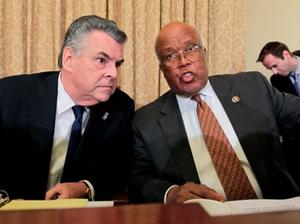Islamic radicalizationCongress hears U.S. "failing" to confront radical Islam
Witnesses at a high-profile congressional hearing on Islamic radicalization said Thursday that America is “failing” to confront the threat posed by homegrown extremism, as lawmakers for hours traded accusations over whether the inquiry unfairly singled out Muslims; the hearing, one of the most controversial in recent memory, featured congressmen, a California sheriff, a Muslim scholar, and witnesses whose relatives had been recruited by radicals; Representative Peter King (R-New York), chairman of the House Homeland Security Committee, vowed to press ahead with more hearings, telling reporters late Thursday that the next panel would probably focus on Islamic radicalization in the U.S. prison system

Chairman Peter King, and Ranking Member Bennie Thompson // Source: tweetbeat.com
Witnesses at a high-profile congressional hearing on Islamic radicalization said Thursday that America is “failing” to confront the threat posed by homegrown extremism, as lawmakers for hours traded accusations over whether the inquiry unfairly singled out Muslims.
The hearing, one of the most controversial in recent memory, featured congressmen, a California sheriff, a Muslim scholar, and witnesses whose relatives had been recruited by radicals. The afternoon was punctuated by a series of tense moments — one lawmaker challenged the credibility of the panel, several suggested the committee’s time could be better spent looking at groups ranging from the KKK to criminal gangs, and Representative Peter King (R-New York) called a press conference afterward in which he accused the hearing’s critics of spreading “mindless hysteria.”
King, chairman of the House Homeland Security Committee, also vowed to press ahead with more hearings, telling reporters late Thursday that the next panel would probably focus on Islamic radicalization in the U.S. prison system.
Fox News reports that the hearing itself aired a divergent set of views on the scope of the threat posed by radical Islam in the United States and the pertinence of holding a hearing focused solely on that topic.
Zuhdi Jasser, president of the American Islamic Forum for Democracy, said “paralysis” over the issue has seized the nation’s leaders and he urged the Muslim community to confront what he called an “exponential increase” in the number of Muslim radicals in the United States.
“The U.S. has a significant problem with Muslim radicalization,” said Jasser, who is Muslim. “It is a problem that we can only solve.”
One lawmaker, Representative Keith Ellison (D-Minnesota), who is Muslim, cried at the end of his testimony as he described the actions of a Muslim-American paramedic who lost his life in the 9/11 terror attacks. Ellison warned that King was implicating the broader Muslim community with his approach.
King, though, launched the hearing with a robust defense of his decision to press forward. He cited recent terror plots against the United States and suggested the hearings could help fulfill the committee’s duty to “protect America from a terrorist attack” by examining the root of recent plots.
“This committee cannot live in denial,” King said, accusing critics of trying to “dilute” the focus by turning attention to groups other than al Qaeda.
“Only al Qaeda and its Islamist affiliates in this country are part of an international threat to our nation,” King said.
He said the hearings
